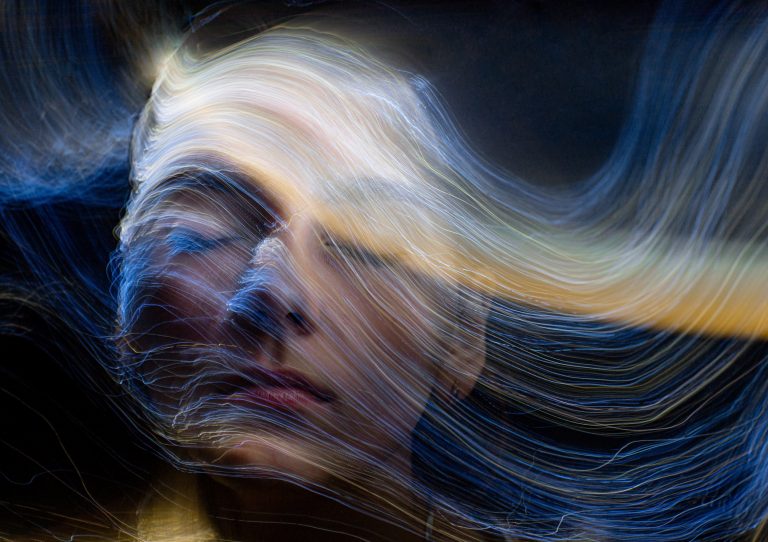The Five Senses – Our Interface with the World
We live in a physical world, which we experience through our senses.
Sight, hearing, taste, smell, and touch provide us with various experiences, some pleasurable and pleasant, some of which leave us indifferent, while others provoke discomfort and sometimes even pain and suffering.
Our physical senses are the obvious and natural way for us to interact with everything that this world has to offer us as a continuous experience rich in stimuli.
We activate these sensors consciously (observing, tasting, smelling, touching, and listening) and unconsciously (because the senses are constantly working in the background, even if we do not want to). The senses awaken diverse emotions within us and activate us within the tangible reality of life.
The five senses function within a defined, confined, and specific space and can sample and recognize only what is physical and material and is outside of us: bodily sensations obtained from the contact of our body with the environment, sights obtained through our eyes that scan the world, sounds that our ears perceive from the space in which we are, flavors that our palate and tongue transmit to us from the interface with varied foods, Smells that the nose transmits to us from the environment around us and with what we come into contact with; all of these provide us with a variety of sensory experiences that create our interface with the space in which we are – rejection and attraction.
The physical experience, which is significantly enhanced through the senses, is intended to develop us, enrich us, connect us to this world and each other, and allow us to experience the reality in which spirit is embodied in matter and soul merges into the body and flesh.
Thus, living in this physical world allows us to experience through our senses an experience that exists outside of us, in a wide and diverse world in which there are many manifestations of matter: opportunities and possibilities, alongside dangers and threats, from which we can choose what is pleasant and good for our existence and also for our senses, and also to reject and move away from what is unpleasant for us and does not support our security and well-being.
The senses give us an immediate report and indication of our relationship with the multitude of options available to us and trigger impulses and instincts.
The senses calm us down or put us on alert; they provide us with orientation and signal to us what an opportunity is and what is a threat; they attract us or keep us away from things, and they also season life and give it shape and color, sound, touch, and taste: tasty or not tasty, soothing to the ears or jarring, pleasing to the eye and beautiful or disharmonious and ugly, pleasant to the touch or painful, has a good smell or smells bad, harmonious or dis-harmonious…
A whole scale of tastes, sights, sounds, sensations, and smells that grant us experience and excitement and provides us with warning signs and signals of danger.
━━━
The development of the senses in the service of human evolution
As human culture evolved, so did more and more ways to use the senses consciously and even manipulate them to bring increased and extended pleasure: tastier, more beautiful, more smelly, more catchy, more stimulating, more and more and more…
As a result, the senses became associated with a wide and increased supply that is often also extreme and exaggerated (which only expanded throughout the development of human civilization) and began to lose their balance and calibration, and to indulge in information coming from the external environment and to demand more and more increased stimuli that give an experience of instant gratification and quick and easy pleasure.
The supply at our disposal has also become deceptive so that many of the possibilities we encounter in everyday life are produced tendentiously to seduce the senses, but they do not necessarily support us and our harmonious existence in body and mind. In today’s reality, not everything that is tasty – is healthy and nutritious, and not everything that feels pleasant – is indeed harmonious for us, and not everything that smells good – supports our body and mind, and not everything that looks perfect and harmonious and beautiful to the eye – is really like that, etc…
Today we are very far from the days when the connection to nature and the processes that sustain life was intimate and close.
The old world was a very physical, analog world with a slow rhythm, locality, and a supply confined to the local city or village’s boundaries, creating a limited supply of possibilities and sensory stimulation for most people.
But throughout human history, as intelligence expanded and knowledge evolved, people sought the next stage and developed methods and technologies to improve sensory experience.
The invention of diverse cooking methods, as well as a variety of textures and ingredients, were intended to delight the senses (I read somewhere that sorbet and ice cream were the lot of the rich and that the Roman emperor would bring ice from the mountains in special boxes and keep them in underground warehouses). Caravans and ships transported spices and perfumes from distant and “exotic” lands, diverse musical instruments became more and more sophisticated, and Art and fashion have evolved and delighted the body and mind through the senses. All of these and many other evolutionary processes are blessed, since the senses were a force that motivated humanity to perfect, improve, develop skills in the matter, and pour ideas and inspiration into the different areas of life to make them more harmonious, pleasurable, and joyful.
━━━
The abstract senses
This process of harnessing the physical senses as an incentivizing force that motivates the person to process matter, improve it, and improve the quality of life can be balanced, promoting, developing, and harmonious – but this is as long as at the same time, there is a constant development of the consciousness, the inner world, inspiration, values and spirituality as well as the inner senses.
Yes, yes. Some senses exist in the person’s inner space and are abstract senses, which provide information that does not come from the outside but from the inner space of the person, that is, from the depths of consciousness.
These are senses that connect to inner knowledge and intuition that direct the person to identify what supports and empowers them and what weakens and destroys them.
It is an internal sensory that makes it possible to identify the energy of materials, people, and situations without touching or creating an interface with them.
It is the ability to smell energy fields and identify from the many possibilities and potentials available – what is harmonious and balanced and what is disharmonic and unbalanced.
It is a metaphysical visual ability that can recognize the particle and energetic texture of reality and, therefore, provides orientation in other dimensions besides the physical one.
But as human evolution evolved, the inner abstract senses weakened, and the physical senses occupied more and more space in human life.
━━━
The connection between the senses, the culture of well-being, law, and religion.
The more attention was transferred to the external physical senses and subsequently to the material and physical world, the connection to the abstract internal senses weakened, in a continuous and tendentious process that distanced people from the pleasure of spiritual growth and expansion of consciousness.
As a result, the connection to consciousness and metaphysical senses lost its appeal and also acquired a distorted meaning.
Many in modern society misinterpret spiritual or conscious growth and automatically associate it with the well-being culture and the wellness industry that follows it.
In other words, the connection to personal growth or meaning is made through increased focus on the body and mind and in a variety of ways to experience mental and physical well-being, thinking that the self is the body and mind, and disconnecting from other aspects of the self and from the consciousness that is in higher dimensions than the physical world.
I do not rule out the trend of wellness. I believe with all my heart that it is extremely important to nurture the body and take care of the mind so that it is possible for a person to experience well-being, comfort, and happiness. But this is only a part of the whole picture, which many mistakenly think that only it exists and therefore abandon the development of consciousness and internal senses that open a gate to an expanded perspective that changes the entire perception of self and the perception of reality.
The development of consciousness and the change of worldview leads to the recognition that the physical senses are only part of the picture and provide a partial picture of reality.
The development of consciousness, which also has a transformation of the mind, and psyche, allows one to limit the role of the external senses and manage them and the psyche.
It is a powerful process in which the person consciously chooses to make use of the senses in a manner that subjects them to the consciousness and meaning that they want to create in their life, and even defines for themselves values that create a framework for their conduct.
But when consciousness is limited, and the human psyche cannot create an independently bounding and guiding framework of values, it leads to the development of ways that impose limitations and reservations on the human senses and impulses, such as religions and law systems.
These systems, which act on the person from the outside, force the limitation of the senses and impulses they provoke and restrain the constant desire for pleasure through a consciousness of reward and punishment and instructions of to-do’s and don’ts.
The limitations, the restraining systems, and the reservations force the heaven-fearing or law-fearing people to quell the pleasures of the senses and to curb the instinctive impulses through clear instructions of what is permissible and what is forbidden and division into commandments and sins, good and wicked, law-abiding and lawbreakers.
Did you understand the idea?
The lack of development of consciousness and the inability to fine-tune and withdraw the senses has created religious myths and social norms that force people to restrain the body’s lusts.
━━━
The senses and technological advancements
The new world, the Internet, and social networks have turned the world into a global village, creating immediate access to information and exposure to many possibilities in a very short time. This has greatly increased the mental stimulation that uses the senses to encourage people to consume, buy and receive diverse services.
The constant desire for pleasure and instant gratification of the senses has created a collective addiction of humanity to constant stimulation in a very fast rhythm of information and supply.
Everything gets more and more out of balance, and for many people, the meaning of life revolves around the need to stimulate the senses through experiences that create pleasure, instant gratification and the need for more, and so on.
The pursuit of the senses leads us as a society to a situation in which many of the common products and services stimulate the senses in a synthetic and processed way: smells produced in the laboratory fill the shopping malls, processed foods are saturated with substances that enhance taste and smell and color, processed images that are mutilated and filtered, music that is produced as a catchy and addictive formula and other examples that all express the forcing of the senses to get out of balance and indulge in sensory satisfaction and pleasure, as well as emotional, physical and intellectual one.
The digital age has created another mental addiction, which encourages the cultural phenomenon of “Fear of Missing Out” or, in short, FOMO – anxiety of missing out, which is social anxiety accompanied by a constant fear of missing out on pleasurable experiences that others experience.
This anxiety, too, stems from the inability to withdraw the senses and postpone gratification and is characterized by a desire to maintain continuous contact with others and a compulsive worry about the fear of missing an opportunity for social, romantic, business, or other satisfying interaction.
Mobile phones, the Internet, and social networks – provide effortless access to anyone who requires constant sensory stimulation.
But this pleasure comes at a high price.
Besides wasting time, mental resources, and financial resources, sensory addiction generates collective social conditioning to prefer everything that generates sensory satisfaction that provides immediate tangible reward and leads to a feeling of fulfillment and pleasure.
Contemporary human culture generates a clear preference for the external senses and everything that provides immediate pleasure and favors what generates a feeling of being temporarily filled. It tends to neglect the internal senses that lead to long, slow, continuous, and deep processes, which the pleasure and satisfaction they bring with them are subtle and come only after time.
━━━
The search for meaning
The human search for meaning is stopped and blocked by a culture that glorifies the focus on the self which is governed by the senses and constant mental stimulation. This leads to the fact that the society we live in pursues materialism, extravagance, and illusory mental images that create distorted standards of beauty, taste, and harmony and how to achieve them.
Contemporary human culture also goes astray after illusory images of what “spirituality” or “meaning” or “inspiration” is and what is the way to achieve them.
Many believe that if they achieve the fulfillment of the senses, they will feel full, valuable, full of meaning, and happy.
From these emerged the culture of wellness, which I mentioned earlier, aimed at a life of well-being but is often focused on sanctifying the focus on the selfish self, physical sensory well-being, and a lifestyle that supports it without seeing a broader context and connecting it to the growth and expansion of consciousness.
This distances people from seeking an inner meaning that is not based on instincts, impulses, lusts, and physical senses, as well as on identification with the body and mind as defining the self exclusively.
All this leads to unfair and paradoxical competition between spirit and matter, in contrast to the optimal state in which the spirit and matter, the consciousness and the body and the psyche, the physical senses, and the metaphysical senses all work with each other in mutual fertilization and harmony.
***
The human being as a generator – the relationship between the growth of consciousness and the senses
Conscious and spiritual growth does not sanctify the selfish self but sees the human being as a holistic being and strives to improve the self and develop it across the entire continuum between spirit and matter, body, mind and psyche, physical senses, and metaphysical senses.
A complete and holistic development process makes it possible to create a harmonious balance between the physical-external and abstract-internal senses, recognizing that the human being is a broad complex that acts as a generator that knows how to activate the spirit within matter and realize abstract ideas as physical reality.
The growth of consciousness moves human beings to a realm that exists beyond the physical senses—a realm in which there is a whole set of additional senses beyond the familiar ones. Metaphysical-abstract-internal senses help a person to open to more dimensions of fulfillment.
The growth of consciousness helps to discover an inner meaning beyond momentary well-being and sensory satisfaction and beyond the physical and body image. It is a meaning with much more extended self-expression: a spiritual, eternal self whose self-image is not based on social norms and models of beauty and value which are based on external senses.
Extended self-expression departs from the boundaries of the selfish self and is connected to a realization in which the personal meaning is connected to a broader meaning of society and of the community in which the person lives. It is self-expression that holds a connection to values that arise from the inner senses of the person and lead them beyond the immediate gratification of the body and mind.
━━━
Changing priorities and nurturing the inner senses
It is a fact in our world that the satisfaction of the physical senses is available and immediate. Therefore, there is a preference for it over the long-term investment of spiritual and cognitive satisfaction, which requires deepening, patience, and the reward it brings satisfies inner and refined senses.
Satisfying one’s inner senses requires patience, refinement, patience and a willingness to expand inwards into the psyche, from an inner search and exploration of one’s existence to an understanding of what is meaningful to them, what values are important to them, what kind of person they want to be and what they want to contribute to the society and community in which they live.
The loyalty to internal growth, expansion of consciousness, and the formation of a solid internal set of values – lead to a personal journey of fulfillment which brings with it long-term and delicate but powerful reward.
It is a refined inner spiritual reward, an inner fullness, and astonishment that inspires the mind and body.
In such pleasure, the abstract and physical senses find taste and beauty in what corresponds to the world of consciousness and values:
Healthy and moral food feels more delicious on the palate because it is harmonious with the human, the earth, and every created being.
A person whose inner being radiates – looks beautiful because the inner harmony is reflected outwardly.
Scents from nature – delight the nose because they connect to a balanced and ecological life.
Aesthetics of matter – pleases the eye as it comes from a sustainable approach that expresses creativity and pure translation of spirit into matter.
The development of the inner senses changes priorities, redefines the boundaries of personal reality, and opens the person to new dimensions within this world in which we play the game of life.
Our world is a beautiful world designed to merge the spirit with matter in a harmonious and balanced way, creating a whole continuum between the abstract and the realized and between the sublime and the material.
The human being, too, is a wonderful being designed to sustain itself throughout the continuum and act as a generator that moves the spirit into matter and grants added value wherever it passes.
Our senses are our personal recording device, which records the experience of life through a variety of channels and enables us to weave living bonds, living moments charged with a diverse sensory experience, to which we are those who pour the spirit, the consciousness, and the meaning into, leaving behind an eternal trail that tells of our existence in time and space.










